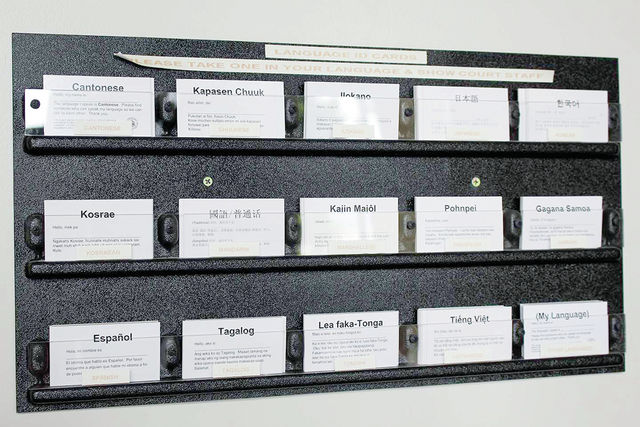LIHUE — A study released Wednesday by the National Center for Access to Justice ranked Hawaii number one in the country for providing support for people with limited English proficiency. On Kauai, 20 court interpreters help people understand about 25
LIHUE — A study released Wednesday by the National Center for Access to Justice ranked Hawaii number one in the country for providing support for people with limited English proficiency.
On Kauai, 20 court interpreters help people understand about 25 languages in the courtroom, while in the entire state more than 380 interpreters help people understand more than 45 languages.
Suzanne Zeng, court interpreter and instructor at the center for interpretation and translation studies at the University of Hawaii at Manoa, said the State Judiciary’s Office on Equality and Access to the Courts has been working hard to improve and increase the services available to Hawaii’s growing LEP population.
“I think they are finally getting the recognition they deserve,” she said.
Zeng, who typically works on Oahu, is sometimes flown to Kauai to assist residents who speak Mandarin.
She said the OEAC office requires a two-day basic orientation workshop for a person to be a registered court interpreter and a multi-tiered program offers incentives to interpreters to advance up the chain.
More than 25 million people in the United States have limited proficiency in English, according to statistics from the National Center on Migration Integration Policy. Hawaii ranked among states with the highest growth rate of LEP individuals and largest LEP population, U.S. Census Bureau statistics showed.
“Hawaii is a uniquely multicultural community, where many languages are spoken,” said Fifth Circuit Chief Court Administrator David Lam. “Our interpreters play a vital role in helping the Judiciary ensure that everyone, regardless of the language they speak, is able to learn about their rights and effectively voice those rights in court.”
Zeng said that as a court interpreter, her job is to be impartial and fair when interacting with defendants or witnesses during a trial.
“I’m not a robot,” she said. “But we’re trained … If they are crying on the witness stand, and you feel like crying that’s a very natural response. There are actual techniques on how to handle that sort of situation.”
Lam said court interpreters’ dedication and skill make them invaluable.
“It is because of their devotion and skill that we are able to provide interpreter services at all points of contact with the Judiciary,” he said. “Defendants, parties, and witnesses in all case types can access interpreter services in as many as 46 different languages.”
Hawaii had an 87 percent access for people with LEP, the most in the nation, according to Justice Index 2016 Findings. New Mexico, which came in second, was ranked as having 83 percent access.
“The new Justice Index findings demonstrate how much we have been able to accomplish with limited resources,” Lam said.
Rodney Maile, administrative director of the Hawaii State Judiciary, said the Judiciary is looking at finding additional ways to improve language access by working on translating court forms into the 12 to 14 languages most frequently encountered in state courts.
The top ranking comes after the U.S. Department of Justice last year closed its review of Hawaii’s language access program, according to the Associated Press. The department intervened in 2012 and provided assistance after receiving complaints about state court language services.




